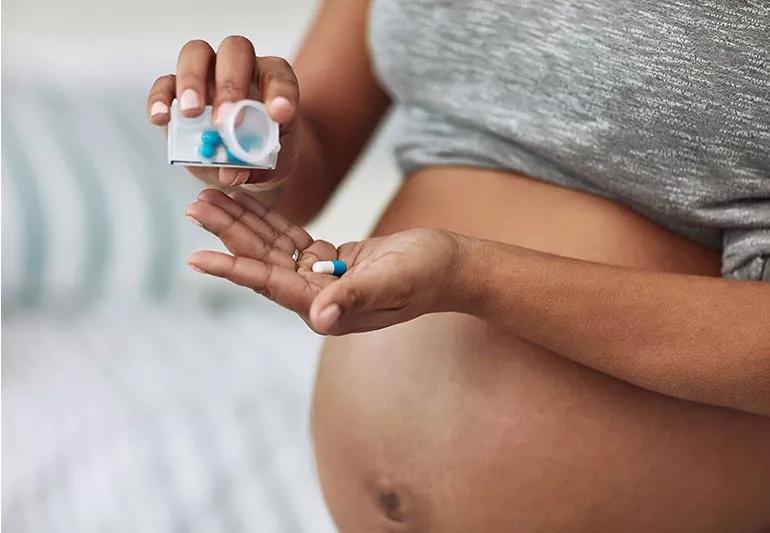An expert outlines the best timing options

Making sure you’re getting all the vitamins and nutrients you need to maintain good health is always important. It’s especially essential when you’re pregnant, as your developing fetus depends on you for all of those needs.
Advertisement
Cleveland Clinic is a non-profit academic medical center. Advertising on our site helps support our mission. We do not endorse non-Cleveland Clinic products or services. Policy
Prenatal vitamins play a big role in helping keep both you and your baby healthy throughout the term of your pregnancy. But the ins and outs of adding them to your routine can raise a lot of questions. We turned to clinical pharmacy specialist Morgan King for answers.
The big reason to take prenatal vitamins is pretty simple: you need to keep yourself health and encourage health fetal development. “All of the nutrients and vitamins will go to the fetus first,” says King. “It needs that nutrition to grow.”
But the mother also needs those vitamins. “While the vitamins and nutrients are essential for the fetal development, you also need key vitamins,” King notes.
Some of those include:
Most prenatal vitamins should contain these, particularly iron and folic acid, both of which are essential. Check with your healthcare provider just in case, though, because if your prenatal vitamins don’t contain certain nutrients, they might recommend a stand-alone dose.
If you’re planning on getting pregnant, King says you should start taking prenatal vitamins as soon as you begin trying. “When an Ob/Gyn looks at dating a pregnancy, they typically start from the patient’s last menstrual period. That means when you find out you’re pregnant, you could be four to six weeks along in your pregnancy already,” she says.
Advertisement
Not all pregnancies are planned, of course, and King says that if you’re not taking prenatal vitamins at the time you discover you’re pregnant, you should start as soon as possible. “Major development happens in the first trimester, those first 12 weeks,” she says. “The spinal cord and brain are developing so those vitamins help with that.”
Additionally, mothers who are breastfeeding are encouraged to continue taking prenatal vitamins to keep providing those nutrients via breast milk.
No, prenatal vitamins won’t help you conceive, says King.
King adds that it’s never too late to start taking prenatal vitamins, either. “While it’s certainly best to start taking them as soon as possible, the baby is developing and growing during the entire pregnancy,” she says.
Once you start taking prenatal vitamins, you should stop taking your daily multivitamin. “You want to make sure you stay within that recommended daily amount of each vitamin,” King says. “While you’ll generally be okay if you go over 100% for some vitamins, others, like Vitamin A, can lead to certain complications.”
If you’re not sure about your intake, check with your healthcare provider who can help you plan out what, if any, extra vitamins you may need. “It’s not out of the question that a mother may need extra folic acid if they’ve had previous complications or extra iron if they’re anemic,” King adds.
“No time of day is any better than another to take prenatal vitamins,” King says.
There are a variety of types of prenatal vitamins you can choose from and it doesn’t matter which you take. “If you look at an ingredients list comparing tablets, capsules and even gummies, the components will be pretty similar,” King says.
Checking the ingredients is important, too, to make sure you’re getting everything you need. Most gummies don’t contain iron, King says, since young children may try to snag some thinking they’re candy and too much iron is dangerous for children.
King says if you’re not breastfeeding your child, it’s okay to switch back to a daily multivitamin after birth.
If you’re breastfeeding, it’s encouraged to continue taking prenatal vitamins until you stop breastfeeding to keep taking in nutrients that provide benefits for both you and your baby.
But, King adds, if you choose to switch back to your daily multivitamin while breastfeeding, that’s okay, too. “You want to make sure you’re optimizing your nutrition since you’re providing those nutrients to the baby. As long as you’re getting the appropriate amount of those vitamins and nutrients, that’s what’s most important.”
Advertisement
Learn more about our editorial process.
Advertisement

Properly prepared, elderberries can be a safe and healthy part of a balanced diet — just steer clear of supplements

Science doesn’t support most claims about this bee byproduct, and supplements have potential risks

The meat-based elimination diet restricts important food groups — like fruits and vegetables — that keep you healthy

Eat your fill of vitamins C, B6 and E, plus zinc and selenium

The vitamins, minerals and other nutrients in the food you eat are essential for a healthy heart, but supplements are another story

Early research shows that this supplement may help, but more studies are needed

The natural supplement may help with weight loss, lower blood sugar and protect your heart

Over-the-counter pills, powders, extracts and tinctures can interact with other medications and cause unexpected side effects

Wearing a scarf, adjusting your outdoor activities and following your asthma treatment plan can help limit breathing problems

Your diet in the weeks, days and hours ahead of your race can power you to the finish line

When someone guilt trips you, they’re using emotionally manipulative behavior to try to get you to act a certain way